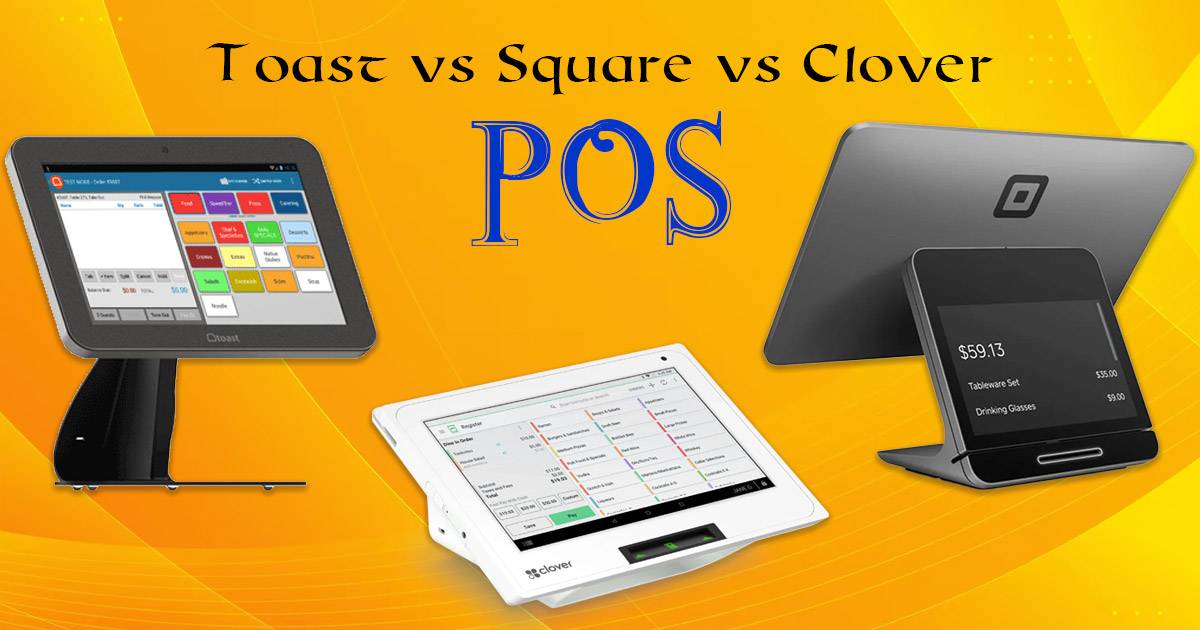Toast vs Square vs Clover: Find Your Perfect POS Match

When it comes to running a business, choosing the right POS (point of sale) system can make all the difference. With so many options available, it’s essential to find one that fits your needs. Toast, Square, and Clover are among the top contenders, each offering unique features and advantages. Understanding their differences is key to making the best decision for your business.
What is a POS System?
A POS system is more than just a way to process transactions. It’s a combination of hardware and software designed to manage sales, inventory, customer interactions, and business analytics. Modern POS systems go beyond cash registers, providing tools to streamline operations, enhance customer experience, and optimize business performance. Whether it’s tracking inventory in real-time or analyzing sales trends, these systems are indispensable for businesses aiming for efficiency and growth.
Who Can Benefit from a POS System?
From small businesses to large enterprises, POS systems cater to a wide range of needs. Here’s a breakdown of who stands to gain the most:
Retail Businesses: Shops, boutiques, and large retail chains benefit from POS systems that handle inventory, process payments, and provide insights into sales trends.
Restaurants: Full-service restaurants, cafes, and food trucks rely on features like menu management, tableside ordering, and split payments to improve customer service.
Service-Based Businesses: Salons, spas, and repair shops utilize POS systems to schedule appointments, manage client records, and process payments seamlessly.
Hospitality Industry: Hotels and event venues use POS systems to integrate room service, reservations, and event management into one platform.
E-Commerce and Online Stores: Businesses selling online need POS systems that sync with their e-commerce platforms for unified inventory and order tracking.
Main Differences Between Toast, Clover, and Square
Choosing between Toast, Clover, and Square involves understanding their unique strengths. Here’s how they compare across key aspects:
Pricing and Transaction Fees
Toast offers flexible pricing plans tailored to restaurants, with entry-level options and add-ons for advanced features. Transaction fees vary depending on the plan but are typically customized to meet restaurant needs.
Square stands out with its free starter plan, charging a flat 2.6% + $0.10 per card-present transaction. This makes it an attractive option for small businesses looking to minimize upfront costs.
Clover provides a range of pricing plans starting at $14.95 per month, with transaction fees of 2.3% + $0.10 to 3.5% + $0.10. Its pricing structure is ideal for businesses seeking scalability.
User Experience
Each system shines in user experience but caters to different audiences. Toast, designed specifically for restaurants, offers intuitive tools like tableside ordering and menu customization. It’s Android-exclusive, which may limit hardware choices.
Square offers simplicity and flexibility, compatible with both iOS and Android devices. It’s easy to set up, though some users find its interface less polished compared to Toast and Clover.
Clover combines ease of use with versatility, making it a favorite for retail and restaurant operations. It’s compatible with various devices, providing a seamless experience for diverse business needs.
Integrations
Toast excels in restaurant-specific integrations, supporting tools for online ordering, delivery, and kitchen management. Its focus on hospitality makes it a robust choice for foodservice businesses.
Square’s extensive app marketplace allows integration with tools for accounting, e-commerce, and marketing, making it ideal for businesses seeking customization.
Clover offers a wide range of integrations across industries, including retail, hospitality, and service-based businesses. Its adaptability ensures compatibility with many third-party applications.
Customer Support
Reliable support is crucial for any POS system. Toast provides dedicated customer support via phone and email, ensuring quick resolution of restaurant-specific issues.
Square’s customer support includes 24/7 live chat and online resources, making it accessible for businesses of all sizes.
Clover’s support is equally robust, offering live chat, phone support, and an extensive knowledge base. Its well-rounded approach caters to diverse business needs.
Other Features
Toast stands out with its restaurant-focused features, including detailed reporting, loyalty programs, and advanced menu management. These tools are designed to enhance the dining experience and streamline operations.
Square offers versatility with features like payroll management, appointment scheduling, and e-commerce integration. It’s a great choice for businesses seeking all-in-one functionality.
Clover combines industry-specific tools with general features like employee management, gift card programs, and custom reporting. Its adaptability makes it suitable for various business models.
Which POS System Should You Use?
The best POS system depends on your business type and goals. Restaurants and cafes may find Toast’s hospitality-focused features invaluable, while small businesses might prefer Square for its affordability and flexibility. Retailers and service-based businesses could benefit from Clover’s versatility and scalability. Evaluate your specific needs, including budget, industry requirements, and desired features, to determine the right fit.
Choosing the Right POS System for Your Business
Selecting a POS system is a critical decision that impacts your business’s efficiency and customer satisfaction. Whether you opt for Toast, Clover, or Square, each system brings unique strengths to the table. Consider factors like pricing, user experience, and industry-specific features to make an informed choice. With the right POS system in place, you can streamline operations, enhance customer experiences, and drive business growth.
